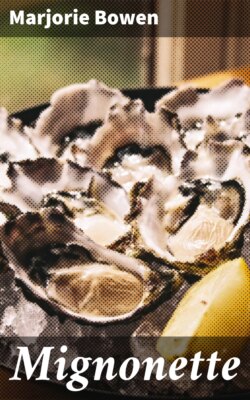Читать книгу Mignonette - Bowen Marjorie - Страница 7
На сайте Литреса книга снята с продажи.
§ 4
ОглавлениеTable of Contents
Before she left the Sandyrock Hotel, Caroline Atwood gave Barbara cheerful and sincere advice.
"I have a happy disposition," she said, "and I have always enjoyed my life, but mine is not an example to be followed, dear Barbara, it does not suit most women to remain single. Oh, I know I have numerous friends and shall never want for anything."
"You think that a woman should marry at any cost?" asked Barbara thoughtfully.
"I do, for what is the alternative? One merely acts as a deputy for another woman's domesticities—again, it suits me quite well."
"Yes, you seem a happier woman than my mother was," said Barbara. "I don't know that marriage is more than—" she sighed and Caroline Atwood laughed.
"A poor best," she completed the sentence. "But there is nothing else in this time and place, save, as I said, having all the cares of another's family, and none of the advantages."
"I wonder what the advantages are," murmured Barbara.
"You would know if you had never had them—ease and security are not to be held lightly. Yours was a hard lot, an only surviving child, and parents ill and elderly."
"But now, as you reminded me, I am rich and free, and you suggest—marriage?"
"You might be happy," continued Caroline Atwood. "I don't think you have a demanding nature."
Barbara was silent and the older woman added with sympathy: "You are very romantic and high-minded—you will want to be sure of so many things, too many things, and you may wait too long."
"Do you not believe in falling in love?" asked Barbara timidly.
"I know that it is rare, and made too much of in stories and legends; it is something most women like to think of—it puts a golden veil over a great deal one doesn't want to think of. Of course, one is very lucky if it comes one's way."
"I always wanted to be married," admitted Barbara suddenly, "since I was a young girl—partly because of those dreams you speak of, partly to get away from home. I never liked Stone Hall. There, I've never said that before."
"It is natural," replied Caroline Atwood quietly. "Perhaps some day women may have lives and work of their own. At present, unless one is eccentric—" she laughed and added, "You are not eccentric, Barbara."
"No, I am most conscious how ordinary a woman I am. I don't even know what to do with this money I have."
She thought, as she spoke, I wish I could make a handsome present to Caroline, but she is so independent I dare not suggest it.
"Have you never met anyone for whom you could care?" asked Miss Atwood gently.
Barbara knew what she wanted to ask and evaded the unspoken question.
"Oh, Caroline, I shall always do the ordinary thing."
Miss Atwood kissed her and left the subject. Their parting was warm, and when she was alone with the amiable but colorless Harding in the hotel full of holiday-makers, Barbara felt very lonely.
